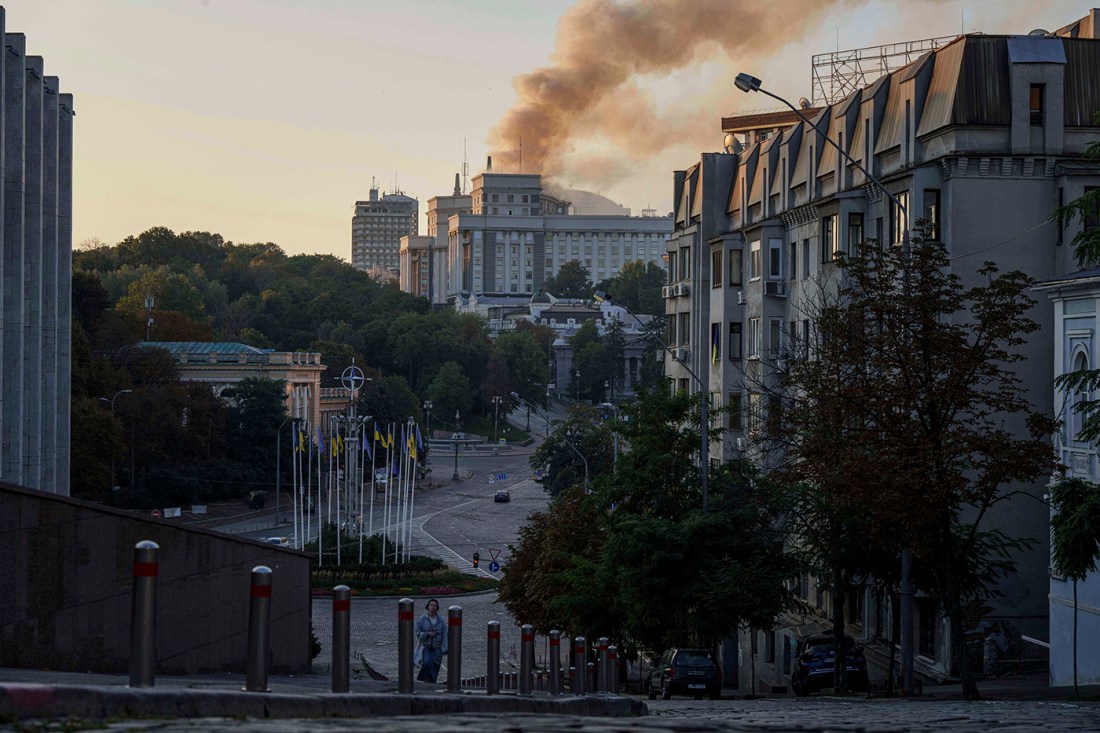Diplomatic efforts have made little progress in the aftermath of a U.S. summit, international relations experts say
Russia struck a government building in Ukraine and sent drones into Poland’s airspace. The escalation is pushing diplomatic efforts in the wrong direction, experts say.

The U.S.-led peace process in the Russia-Ukraine war is “fizzling” following Russia’s latest assault on a government building in Kyiv and drone incursions into Polish airspace, according to a Northeastern University expert.
Mai’a Cross, dean’s professor of political science, international affairs and diplomacy, says that diplomatic efforts have made little progress in the aftermath of a U.S. meeting between President Donald Trump and Russian President Vladimir Putin.
“Trump has been gradually distancing himself from Putin,” she says. “The peace process itself seems to be fizzling.”
On Sunday, Russia struck a government building in Kyiv for the first time since the war began more than three years ago. On Wednesday, Polish officials said they struck down Russian drones that had been flying in Polish airspace with the help of NATO.
A month earlier, all eyes were on Alaska, where Trump and Putin met for a summit that marked the beginning of a potential effort to end the war. Trump had set a series of deadlines for Putin to negotiate terms with Ukrainian President Volodymyr Zelenskyy, the latest of which came and went on Monday.
Cross says Putin might be taking advantage of an interlude in the negotiations as a show of force and commitment while the Russian economy teeters on the edge of collapse.
“There’s a lot of political symbolism in striking government buildings,” Cross says.
At the same time, the attack — coming days after Russia killed at least 23 people, including four children, in one of its largest aerial assaults to date — may just create more tension between the Trump administration and the Kremlin.
Cross says that, at this stage, it seems unlikely that Putin is attempting to kill high-ranking Ukrainian officials in carrying out strikes on government infrastructure. It’s unclear, she says, what the Kremlin was looking to accomplish in the strikes.
“This is all speculation at this point, but if Putin has calculated that if he’s going to work through this stalemate to some final outcome where he ultimately gets what he wants, then Zelenskyy could actually be the actor that he thinks he can deal with,” Cross says. “There are also norms of conduct in wars that shun the deliberate targeting of civilians and non-combatants that also apply to government officials.”
But what is clear, she says, is that Putin is trying to shore up domestic support — not just for the war effort, but to secure his grip on power.
Pablo Calderon-Martinez, associate professor in politics and international relations at Northeastern University in London, says the downed drones in Polish airspace is “a step in the wrong direction” for Europe.
He says the incident could have been an “operational mistake or strategic posturing.” Russia’s Defense Ministry said this week that its overnight drone operation targeted only Ukrainian sites, and that no Polish targets were intended.
Cross said the incident is a significant escalation, and unprecedented in the context of the ongoing war.
Editor’s Picks
Early assessments show that there were at least “19 violations” — 19 drone incursions — recorded over seven hours involving nine crash sites, Polish Prime Minister Donald Tusk told the country’s parliament.
It’s a jittery time for Poland, Calderon-Martinez says — and for good reason.
“Poland cannot afford to be neutral in this conflict,” he says. “This is existential for Poland.”
The development at the Polish border comes as European states have started to ramp up defense spending. In June, NATO leaders agreed to increase defense spending up to 5% of each country’s gross domestic product by 2035 — an apparent effort to deter Russia amid serious questions about the future of U.S. support.
“At this moment in time, I don’t see Europe deviating from providing unconditional support for Ukraine,” he says. “I don’t want to sound hyperbolic here, but this war could be existential for Europe, and that’s why Europe has been steadfast in its support for Ukraine.”
Calderon-Martinez adds that he “doesn’t see how it would be in Russia’s best interest to openly attack a NATO country.”
“I don’t even think the more hawkish elements of the Trump administration would let that happen,” he says.
“The foundation of the security apparatus of the United States and Europe is this transatlantic alliance,” he adds.
Trump addressed the incident on social media Wednesday, but didn’t elaborate on what it might mean for his administration’s approach going forward.
“What’s with Russia violating Poland’s airspace with drones?” Trump said on Truth Social. “Here we go!”





